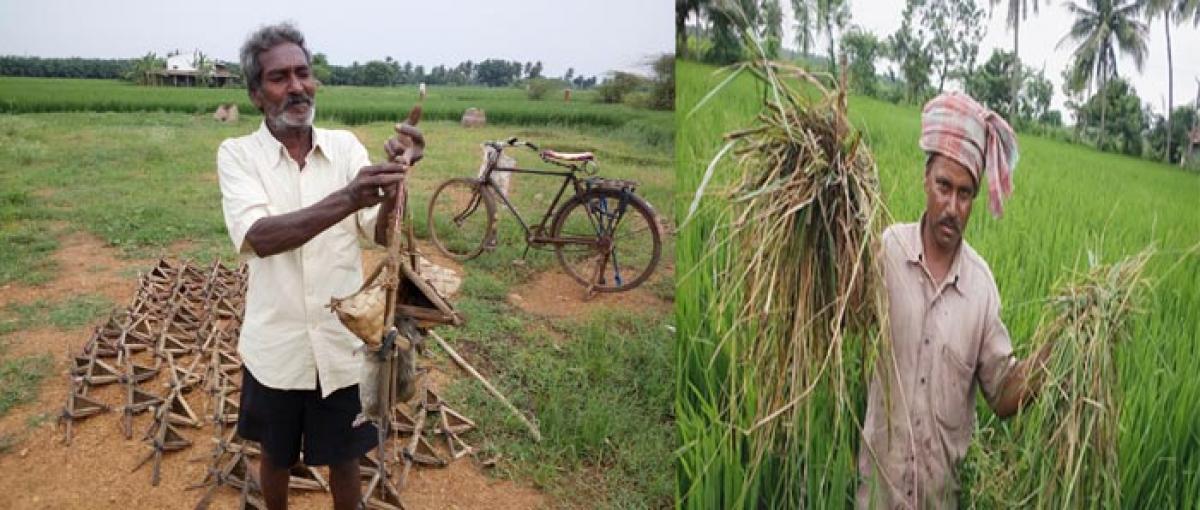Live
- Ayija BJP Celebrates Telangana Liberation Day and Honorable Prime Minister Narendra Modi's Birthday
- Ganesh Visarjan: Peaceful Immersion Process Underway in Hyderabad, says CP
- Social media platforms must register with DIPR: Meghalaya govt
- Collective Efforts Ensure Peaceful Ganesh Immersion: Cyberabad CP
- Nagaland killings: SC closes FIR, criminal proceedings against Army personnel
- Softening of WPI inflation to cut production costs, demand surge for consumption
- ‘Humbled & honoured’, says PM Modi on receiving birthday wishes
- Atishi as Chief Minister will be national security concern: Tarun Chugh
- Praja Palana Day Celebrations at Cyberabad CPO
- Telangana Government to Announce New Policy for SMEs Tomorrow
Just In

The farmers, who first faced acute water shortage at the time of transplanting the paddy, are now experiencing rodent menace. Rodents make at least 20 burrows in farm bunds and destroy the crop. As a result, farmers are spending thousands of rupees to check the menace. In East Godavari district, paddy is
Pithapuram: Rodent menace is eating into profits of farmers and giving them nightmares. Each farmer has to spend nearly Rs 30 to Rs 50 to get rid of rodents. Each farmer has been incurring an additional expenditure of Rs 2,000 to Rs 3,000 per acre because of the menace. Rodent infestation has been on the high end, wherein at least 30 to 40 rodents are found per acre. Rodents nibble the roots of paddy bushes affecting the growth of the crop at the ripening stage.
The farmers, who first faced acute water shortage at the time of transplanting the paddy, are now experiencing rodent menace. Rodents make at least 20 burrows in farm bunds and destroy the crop. As a result, farmers are spending thousands of rupees to check the menace. In East Godavari district, paddy is being cultivated in 2.52 lakh hectares in the Godavari delta, central delta and upland areas. Nomadic people who are good at catching rats are going about villages and enquiring farmers for work. They charge Rs 30 to Rs 50 for catching rats, by placing rat traps in the fields. Farmers have to book their services 15 days in advance since demand for their services has grown in the recent days.
Moreover, they are entering into contracts to catch the rats. Farmers have to pay them for each rat depending on the total number of trapped rats. A farmer in Gollaprolu mandal had to spend Rs 2,000 to Rs 3,000 per acre additionally because of the rodent menace. At least 90 rats were trapped in his two-acre paddy field. The agriculture department advised the farmers to use rodenticide Bromadiolone. Farmers complained of rodent migration from one farm to the other upon application of the rodenticide. Therefore, they preferred setting the rodents trapped.
The demand for people fixing rodent traps has grown considerably because it is an elaborate procedure. First they weave a small basket using palmyra leaves. Two bamboo strips and rubber clips are fixed to the basket. Paddy is put inside the basket. Once the rodent enters the trap it will get stuck in a rubber loop and get killed. The traps are fixed usually in the afternoon and are removed next day morning. Rodent catchers Palivela Sattiraju and Chittibabu said that their business has been booming this year. According to Agriculture department officials, the rodenticide has been supplied to the farmers twice so far. In fact, 2,529 kg of rodenticide has been supplied for use in 2.52 lakh hectares.
Pithapuram Agriculture officer Ch Satyanarayana and assistant director A Padmasri said that the rodenticide has been supplied in the first week of June and again from September 16. The rodenticide should be mixed with broken rice and oil and placed in the field. Four grams of the rodenticide is sufficient to take care of rodents in one acre. They urged the farmers to apply the rodenticide taking the whole village as a unit. They said that the programme to destroy the rodents has been completed. However, they point out that there are still complaints about the rodent menace. The rodents mushroomed in dry lands as many farmers did not go for the Dalwa crop. Moreover, the season is conducive for rodents to multiply.

© 2024 Hyderabad Media House Limited/The Hans India. All rights reserved. Powered by hocalwire.com







